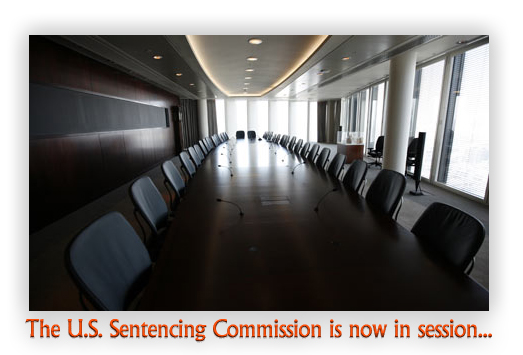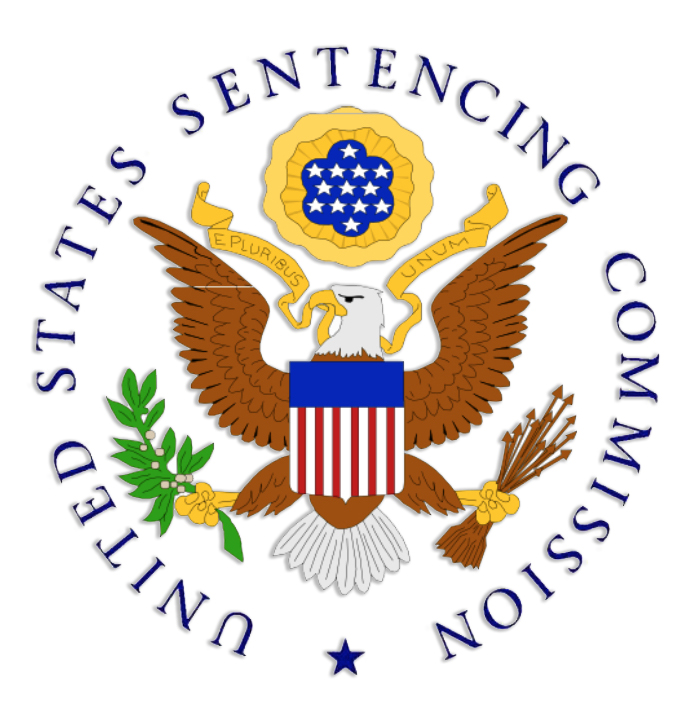We post news and comment on federal criminal justice issues, focused primarily on trial and post-conviction matters, legislative initiatives, and sentencing issues.

SENTENCING COMMISSION DROUGHT IS LIFTING
 President Biden yesterday nominated a bipartisan slate of seven candidates to serve as commissioners on the U.S. Sentencing Commission. If confirmed, the nominees will revitalize the USSC, giving it its first quorum in almost four years.
President Biden yesterday nominated a bipartisan slate of seven candidates to serve as commissioners on the U.S. Sentencing Commission. If confirmed, the nominees will revitalize the USSC, giving it its first quorum in almost four years.
The list includes U.S. District Judge Carlton W. Reeves (Southern District of Mississippi). If confirmed by the Senate, he will be the first black jurist to chair the 33-year-old commission’s history.
By statute, the Commission must be bipartisan and consist of at least three federal judges and no more than four members of each political party.
Biden’s planned nominees include three active judges and four attorneys. Of those nominees, two have experience as public defenders. Nominees also include
• Laura Mate, a former assistant federal public defender in the Western District of Washington, serves as Sentencing Resource Counsel for the Federal Public and Community Defenders in Arizona;
• Judge Luis Felipe Restrepo, appointed by President Obama to serve on the US Court of Appeals for the Third Circuit and a former assistant federal public defender in the Eastern District of Pennsylvania;
• Claire McCusker Murray, formerly principal deputy associate attorney general in the Dept. of Justice during the Trump Administration;
• Judge Claria Horn Boom, appointed by President Trump to the U.S. District Courts for both the Eastern and Western Districts of Kentucky;
• Former U.S. District Judge John Gleeson (EDNY), a partner at Debevoise and Plimpton LLP, who enjoys close to rock-star status as a forward-thinking sentence reformer;
• Candice Wong, Assistant United States Attorney and Chief of the Violence Reduction and Trafficking Offenses Section in the United States Attorney’s Office for the District of Columbia.
 The Sentencing Commission has lacked a full slate of commissioners for the entirety of the Trump Administration, and has not had a quorum since the First Step Act passed in December 2018. That is why no guideline has been amended since the November 2018 amendments went into force.
The Sentencing Commission has lacked a full slate of commissioners for the entirety of the Trump Administration, and has not had a quorum since the First Step Act passed in December 2018. That is why no guideline has been amended since the November 2018 amendments went into force.
Trump nominated four commissioners in August 2020, two of whom – Judges Restrepo and Boom – were renominated yesterday. Their nominations expired when the Senate did not act on them prior to the end of the 116th Congress in January 2021.
The Commission has a stack of work waiting for its attention, chief among the issues being compassionate release. Last November, the sole remaining member of the Commission at the time, Senior Judge Charles Breyer (N.D. Cal.) complained to Reuters that the lack of quorum meant the Commission could not provide guidance on how to implement compassionate release, creating a “vacuum” in which judges inconsistently decide whether inmates under the measure can secure a sentence reduction under 18 USC § 3582(c)(1)(A)(i) amid the COVID-19 pandemic.
“Some people were granted compassionate release for reasons that other judges found insufficient,” he said. “There was no standard. That’s a problem when you try to implement a policy on a nationwide basis.” The Commission’s outdated Guideline 1B1.13, ignored by most circuits but used as a bludgeon by others, was perhaps the primary mischief-maker, but with no quorum, the USSC has been powerless to fix things.
Don’t expect immediate miracles. The Commission normally works on a 12-month cycle, with proposed topics for amendments to the Sentencing Guidelines issued late in the year, followed by the actual amendments early in the following year, and a final slate of amendments by May 1. Under the law, the amendments take effect on November 1, unless Congress votes to veto one or all of them.
This means that the most anyone can hope for would be amendments to take effect on November 1, 2023.
 Still, the slate of new commissioners would be the most defendant-friendly bunch to ever run the USSC. Ohio State University law professor Doug Berman wrote in his Sentencing Law and Policy blog yesterday, “Because these selections have surely been made in consultation with Senate leadership, I am reasonably hopeful that hearings and a confirmation of these nominees could proceed swiftly. (But that may be wishful thinking, as was my thinking that these needed nominees would come a lot sooner.) There is lots of work ahead for these nominees (and lots of blog posts to follow about them and their likely agenda), but for now I will be content with just a ‘Huzzah!’”
Still, the slate of new commissioners would be the most defendant-friendly bunch to ever run the USSC. Ohio State University law professor Doug Berman wrote in his Sentencing Law and Policy blog yesterday, “Because these selections have surely been made in consultation with Senate leadership, I am reasonably hopeful that hearings and a confirmation of these nominees could proceed swiftly. (But that may be wishful thinking, as was my thinking that these needed nominees would come a lot sooner.) There is lots of work ahead for these nominees (and lots of blog posts to follow about them and their likely agenda), but for now I will be content with just a ‘Huzzah!’”
He’s right. Its progress, however slow in coming.
Bloomberg Law, Biden Names Seven to Restock US Sentencing Commission (May 11, 2022)
The White House, President Biden Nominates Bipartisan Slate for the United States Sentencing Commission (May 11, 2022)
The White House, President Donald J. Trump Announces Intent to Nominate and Appoint Individuals to Key Administration Posts (August 12, 2021)
Reuters, U.S. sentencing panel’s last member Breyer urges Biden to revive commission (November 11, 2021)
Sentencing Law and Policy, Prez Biden finally announces a full slate of nominees to the US Sentencing Commission (May 11, 2022)
– Thomas L. Root

